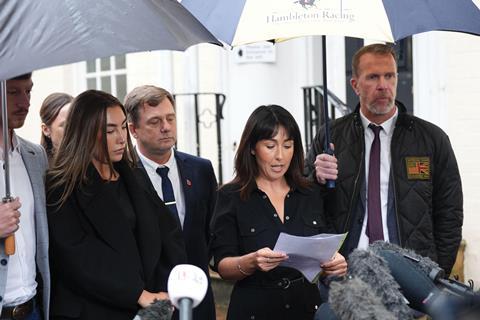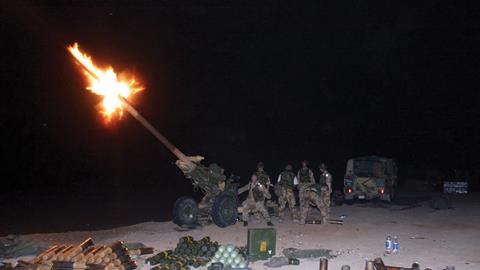Despite piecemeal reform, is our military justice system continuing to fail service personnel? Catherine Baksi reports
The low down
On the 80th anniversary of Victory in Europe Day, the nation remembered the sacrifice of men and women who gave their lives in the second world war. Those who have served in other theatres of war and currently in the forces were also saluted. But, for some who are injured due to negligence, faulty equipment or poor training, seeking justice from the Ministry of Defence can be an uphill battle. Those – mainly women – who have suffered sexual harassment and assault also report that they struggle to have their claims investigated or prosecuted. Conviction rates are much lower in military courts. Meanwhile, government plans to remove immunity could put veterans who served in Northern Ireland at risk of prosecution.
In a bid to tackle a recruitment crisis, UK armed forces are to implement a standardised process across the three services. The scheme, launching in 2027, will replace the discrete programmes run by the Royal Navy, British army and Royal Air Force.
But Hilary Meredith-Beckham, a specialist military law solicitor and visiting professor of law and veterans’ affairs at the University of Chester, warns that the decision by the Labour government to repeal the controversial Legacy Act will itself lead to ‘massive recruitment problems’.
In a measure designed to protect former soldiers, the Northern Ireland Troubles (Legacy and Reconciliation) Act 2023, introduced by the Conservative government, banned inquests and offered conditional immunity to those suspected of crimes relating to the Troubles. In September 2024, however, the Court of Appeal, Northern Ireland, ruled that the act breached the European Convention on Human Rights because it gave the UK government too much veto power over disclosure of material by a commission investigating killings. The case had been brought by several bereaved relatives who argued that the commission was not sufficiently independent.
Last December, Northern Ireland secretary Hilary Benn pledged to repeal and replace certain elements of the legislation, including the amnesty for suspects of Troubles-related cases. In an oral statement to parliament, Benn said: ‘The approach taken to legacy by the last government was wrong… and aspects of the Legacy Act have now been found by the courts to be incompatible with our obligations under the [ECHR].’
Benn laid a ‘remedial order’ removing all provisions relating to the immunity scheme, which he argued ‘would have enabled any of those who perpetrated the most appalling terrorist crimes to seek immunity from prosecution’. But he accepted that ‘with the passage of time, the prospect of successful prosecutions is increasingly unlikely’.
Benn said that the order would also enable all civil proceedings that were prohibited by the Legacy Act, including future cases, to proceed. He announced his intention to introduce primary legislation ‘when parliamentary time allows’ – though the government has yet to act.
The change in law could leave hundreds of special forces veterans facing the prospect of prosecution for incidents that took place decades ago. The move prompted the SAS Regimental Association, which represents regular and reserve units of the Special Air Service, to urge its members to write to their MPs, warning that their comrades, many of them in their seventies and eighties, faced being ‘unjustly hounded’ as a result.
Meredith-Beckham, who gave evidence to the Commons select committee on the Iraq historic abuse cases, which contributed to the closure of the Iraq Historic Allegations Team (IHAT), called for an inquiry into the number of veterans who could face investigation. ‘We need to understand why and how so many Northern Ireland veterans are fearing unjust treatment,’ she says.
Meredith-Beckham tells the Gazette: ‘The IHAT investigation, which saw thousands of British soldiers who served in Iraq from 2003 to 2009 falsely accused of brutality and abuses against civilians, was one of the most shameful episodes in modern legal history.’
She adds that ‘history cannot be allowed to repeat itself,’ and that it is ‘shocking that Keir Starmer is planning to repeal [the act]’.
Meredith-Beckham observes that decision-making and planning in the army in the 1970s was very different from today, and suggests that repealing the Legacy Act will ‘add fuel to an already difficult situation’.
A spokesperson for the Northern Ireland Office said: ‘We recognise the dedicated service and sacrifice of members of the armed forces who did so much to keep people in Northern Ireland safe during the Troubles, and are committed to supporting all our veterans. There can be no rewriting of history.’
But the spokesperson added: ‘The approach taken by the previous government through the Legacy Act did nothing to help veterans, and it has been found by the courts to be unlawful.’ In advance of new legislation, the secretary of state for Northern Ireland is ‘engaging with all interested parties – including the veterans community – about how to ensure there are legacy mechanisms in place that are fair, lawful and proportionate’.
In a different theatre, more than 30 people who served with or alongside UK special forces in Iraq and Afghanistan gave eyewitness accounts to the BBC’s Panorama of alleged war crimes committed over more than a decade by colleagues. They claim to have seen members of both the SAS and SBS – the Royal Navy’s elite special forces regiment – murder unarmed people in their sleep and execute handcuffed detainees, including children.
Responding, the Ministry of Defence said that it was ‘not appropriate’ for it to comment on allegations which may be in the scope of the ongoing judge-led public inquiry into the alleged war crimes, but urged veterans who have relevant information to come forward.

Meanwhile, in a very different context, recent high-profile cases, including that of 19-year-old Royal Artillery Gunner Jaysley Beck, who took her own life in her room at Larkhill barracks in December 2021, have exposed the problem of sexual abuse in the armed forces, where women account for 11% of personnel. A coroner ruled that the army’s failure to take action after Beck was assaulted by a senior sergeant had ‘more than a minimal contributory part in her death’.
But, even where complaints are investigated and prosecuted, relatively low conviction rates raise the question of whether sexual offences should be dealt with in military courts – presided over by a civilian judge with a board of military personnel who act as the jury – or in a civilian Crown court. An investigation by the website openDemocracy revealed that a quarter of cases heard in the military courts since 2018 related to sexual offences, with 77% of men tried for rape in courts-martial found not guilty.
The last set of published statistics for courts-martial found that, from 2018-2024, just 23% of 93 rape cases resulted in a conviction for rape by a military board.
These figures are in stark contrast to the statistics on civilian Crown courts. In 2023 research by Professor Cheryl Thomas at University College London indicated a 70% conviction rate in rape cases.
Victims of the most serious crime, whether service personnel or civilian, deserve the best possible chance at justice
Emma Norton, Centre for Military Justice
Critics, says Emma Norton, who founded the Centre for Military Justice, ‘will say the numbers involved [in military courts] are much, much smaller and so we are not comparing like with like’. She adds that it is important to acknowledge that distinction.
As the backlog of cases in Crown courts remains at over 73,000 and defendants and complainants wait years for trials, one benefit of the court-martial over the civilian process is that cases get to trial more quickly. But Norton observes that in the military system, the conviction rate for rape and serious sexual assault remains ‘stubbornly low’ – something she says that is ‘hard to understand, let alone accept’.
She adds: ‘Victims of the most serious crime, whether service personnel or civilian, deserve the best possible chance at justice. If a servicewoman is fortunate enough to get her rape case to trial at court-martial, the statistics still seem to show that she is more likely than not going to see her attacker acquitted.’
In the wake of the inquest into the death of Beck, whose family Norton acted for, the services announced reform of the way that complaints are investigated. For all three branches, complaints will be handled by a new investigatory body outside the chain of command, and the complaints unit will include civil servants as well as military personnel.
Nevertheless, the reforms do not go as far as many campaigners want, and the statistics on conviction rates have prompted critics to call for wider reform of the service justice system.
Hannah Swarbrick, a solicitor in the military claims team at Bolt Burdon Kemp, says that the system is ‘failing our service personnel’. Change is ‘desperately overdue’.
The service justice system, claims Swarbrick, ‘is not fit to investigate serious crimes such as sexual assault and rape’. She adds: ‘There have been calls for years for these cases to fall under the civilian justice system, along with other serious crimes, such as murder, manslaughter, domestic and child abuse cases, but nothing has changed.’
Having the jury comprise military personnel ‘who are having to make decisions over their employer’s responsibility for the crime’, she argues, means that the system is ‘not impartial’. Such a system, she suggests, ‘would be unfathomable’ in a civilian court.
‘We know anecdotally that these juries, albeit randomly selected across the services, can be influenced into making decisions which are self-serving,’ adds Swarbrick, citing the influence of promotion opportunities or posting applications.
Moreover, the way the service justice system handles allegations of sexual assault can lead to a ‘double trauma’ for complainants who are ‘subjected to a miscarriage of justice when it goes unpunished’.
Failures in the initial stages of reporting alleged incidents – as evidenced in the Beck case, adds Swarbrick – can mean that vital evidence is missing if cases do reach a court-martial.
While the system does allow some of these crimes to be transferred to the civilian justice system, claimant lawyers suggest that this rarely happens. Some argue in favour of moving all such investigations and prosecutions to the civilian justice system.
The Gazette put these points to the MoD. A spokesperson said: ‘It is misleading to compare the civilian and military justice systems. A far higher proportion of cases within the service justice system proceed to trial and the comparisons of conviction rates cited are flawed and should not be relied upon.’ The service justice system ‘is designed to deal with all offences committed by those subject to service law, providing a system that takes into account the unique nature of military service and prioritising support for the victims and witnesses of crime’.
The MoD is now considering the current model of concurrent jurisdiction between the civilian and service justice systems in respect of serious offences such as rape.
Following years of advocacy and litigation by women affected by sexual violence in the armed forces, some improvements have been made. These include the establishment of a victims’ care unit, and the requirement for service personnel to be informed of their right to report sexual offences to the civilian police.
An agreement between the Crown Prosecution Service and the Service Prosecuting Authority has also given complainants the right to be consulted on whether cases are dealt with by the civilian or military justice system.
These ‘important changes’ over the past two years, says Norton, have had some positive effects. In particular, the victims’ support unit is ‘doing particularly good work’ in ‘finally bringing armed forces victims more into line with civilian victims, advocating for them and providing meaningful help which has been dreadfully lacking before now’.
The MoD spokesperson said: ‘Unacceptable and criminal behaviour has absolutely no place in our armed forces, and we are acting to support victims, investigate allegations, and ensure perpetrators face justice.’
The MoD points to initiatives to tackle such behaviour, including the Defence Serious Crime Command and Victim Witness Care Unit, the creation of the Violence Against Women and Girls Taskforce and a specialist tri-service team to deal with the most serious complaints. In addition, the ministry is establishing an independent Armed Forces Commissioner with the power to visit defence sites unannounced, and to investigate and report to parliament on any welfare matters affecting service life.
Norton believes ‘there is far to go’ and it is ‘too soon to say whether changes to military policing will lead to improved conviction rates’.

Last year, the MoD accepted responsibility for the hearing loss suffered by former armed forces personnel in a settlement agreed at the High Court.
Military personnel are exposed to loud noises, such as gunfire and bombing, but the ministry had until 2024 opposed many claims, blaming individuals for not wearing protection or arguing that cases were brought too late. But in the agreement, it accepts that those discharged after 1987 could be eligible for compensation.
More widely, military personnel are being let down when it comes to claiming compensation for injuries sustained during their service, say lawyers.
Clare Stevens, a solicitor in the Manchester office of JMW, has specialised in personal injury claims by military personnel for nearly 20 years. She says her clients represent a ‘reluctant cohort of claimants’ and only bring actions ‘when things have gone badly wrong’.
Stevens acted for two of the families of three men who died following an SAS endurance march in the Brecon Beacons in 2013. She says the services fail to learn from past experiences to improve health and safety.
‘They make promises to families at inquests that things will change, but then a year or two years later, they are back in another inquest and it’s the same issue,’ she laments.
Stevens argues that the MoD should lose its immunity to prosecutions for failings. ‘Until they are exposed to prosecution, they will continue to have an unsatisfactory approach to health and safety,’ she says.
Another claimant solicitor, who did not want to be named, complained about the ‘tendency on the part of the MoD on occasions to prolong litigation where it might take an early view on the merits of the claims and seek to settle the claim earlier’.
Responding, the MoD’s spokesperson said: ‘We take the health and welfare of our personnel very seriously and are committed to their safety. We have robust policies in place to ensure defence activities are conducted safely and risks are kept as low as reasonably practicable,’ adding that policies and training are regularly reviewed.
Where claims do arise, the spokesperson stressed that they are ‘considered on the basis of whether or not the Ministry of Defence has a legal liability to pay compensation’, adding that where there is a proven legal liability, compensation is paid.
War wounds: making a claim

The scheme, which came into force on 6 April 2005 and is managed by the Ministry of Defence, is administered by MOD Veterans UK. It replaced the previous compensation arrangements provided by the War Pension Scheme and the attributable elements of the Armed Forces Pensions Scheme.
According to latest figures, of the 4,296 injury/illness claims that were registered and cleared during 2023/24, 57% resulted in compensation awards, 11% accepted no award and 31% were rejected. Total compensation for service-attributable injury or illness amounted to £131.3m and the sum paid to survivors following deaths caused by service was £16.5m.
The scheme is designed to provide compensation, irrespective of fault, across the full range of circumstances in which illness, injury or death may arise as a result of service. There are two main types of AFCS awards: a tax-free lump sum payment for pain and suffering; and a guaranteed income payment, tax-free, index-linked and paid monthly.
Claims must be made within seven years of the earliest of the following dates – the date of the incident leading to the injury or illness; the date on which an injury or illness not caused by service was made worse by service; in the case of illness, the date of first seeking medical advice for that illness; or from the date of discharge.
Specialist solicitor Hilary Meredith-Beckham (pictured) argues that the scheme is ‘not fit for purpose’. She says: ‘Veterans who have made huge sacrifices for their country are being consistently failed’ by the scheme. She believes a commission should now be formed to overhaul the whole process.
Catherine Baksi is a freelance journalist
































No comments yet